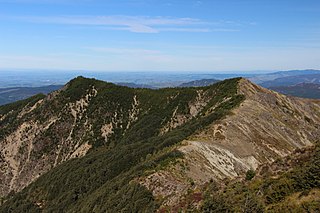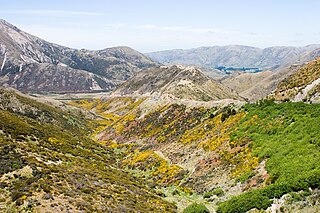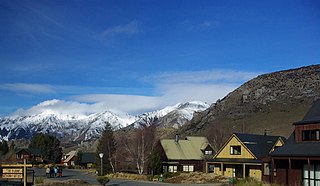
The Port Hills are a range of hills in Canterbury Region of New Zealand, so named because they lie between the city of Christchurch and its port at Lyttelton. They are an eroded remnant of the Lyttelton volcano, which erupted millions of years ago.

Mount Hutt rises to the west of the Canterbury Plains in the South Island of New Zealand, above the braided upper reaches of the Rakaia River, and 80 kilometres west of Christchurch. Its summit is 2190 metres above sea level.

Arthur's Pass National Park is located in the South Island of New Zealand and covers 1,185 km2 of mostly mountainous terrain. Adjacent to it lies Craigieburn Forest Park. The park is administered by the Department of Conservation.

Craigieburn is the name of a settlement and several geographic features in northwest Canterbury, in New Zealand's South Island.

Springfield, called Kowai Pass until 1880, is a small town in the Selwyn District of Canterbury, in the South Island, of New Zealand. Springfield is situated in the foothills of the Southern Alps as the most westerly town of the Canterbury Plains. Springfield is 65 kilometres (40 mi) west of Christchurch on State Highway 73, 9.7 kilometres (6.0 mi) northwest of Sheffield and 22.7 kilometres (14.1 mi) from Darfield. It is located close to Porters Ski Area, Mount Cheeseman, Broken River, Temple Basin and Craigieburn ski fields. Springfield has a long association with the Midland railway line.

Conservation park is a type of specially protected land status held by the Crown in New Zealand for conservation purposes. The status is established under the Conservation Act 1987 and the parks are administered by the Department of Conservation (DoC).

The Kakanui Range is a range of high hills located inland from Oamaru in the South Island of New Zealand. The range forms a boundary between the valley of the Waitaki River to the north and the high plateau known as the Maniototo and the upper watershed of the Taieri River to the southwest.

Lake Lyndon is a small lake in the Canterbury region of New Zealand's South Island. It is located near Porters Pass on State Highway 73 after Springfield heading into the Southern Alps. The lake regularly freezes in winter due to its elevation and location on the outer border of the Southern Alps.

Porters Pass is a mountain pass in the Canterbury region of New Zealand's South Island.

Mount Dobson is the common name for Dobson Peak as a result of being used for the name of a ski resort near Fairlie in South Canterbury, South Island of New Zealand. There is an official Mount Dobson being 702 m (2,303 ft) high at the northern end of the South Island in Marlborough District between Blenheim and Picton, and an unofficial Mount Dobson in the Southern Alps at 2,265 m (7,431 ft) only a short distance due west. Accordingly confusion could arise.

Porters, is a commercial ski resort just over an hour's drive (98 km) west from Christchurch, in the South Island of New Zealand. Originally functioning as a club skifield, it has one beginner magic carpet, one platter tow, one chairlift and three t-bars. The difficulty of the slopes is distributed as 15% beginner, 35% intermediate and 50% advanced. Modern grooming equipment is used, and snowmaking facilities operate along the main pistes along the chairlift.

Craigieburn Forest Park is a protected area in the South Island of New Zealand, adjacent to Arthur's Pass National Park to the north.

Castle Hill Village is an alpine village in Canterbury, New Zealand that was established in 1982.

Canterbury in New Zealand is the portion of the South Island to the east of the Southern Alps / Kā Tiritiri o te Moana, from the Waiau Uwha River in the north, to the Waitaki River in the south.

Charles Obins Torlesse was a prominent surveyor for the Canterbury Association in Canterbury, New Zealand.

Korowai / Torlesse Tussocklands Park is a protected area in Canterbury, New Zealand. Covering around 21,000 hectares, it is located on both sides of State Highway 73, from east of Porters Pass to south of Castle Hill Village.

The Two Thumb Range is a range of mountains in the Canterbury Region of New Zealand's South Island. It is located to the east of Lake Tekapo and has several peaks which rise to around 2,500 metres (8,200 ft). The southern end of the range contains one of Canterbury's main skifields, Mount Dobson.
Hunters Hills is a range of mountains in South Canterbury, New Zealand.

Mount Eglinton is an 1,854-metre-elevation (6,083-foot) mountain summit in the Fiordland Region of New Zealand.

Alma is a 2,510-metre-elevation (8,235-foot) mountain in the Canterbury Region of New Zealand.
























